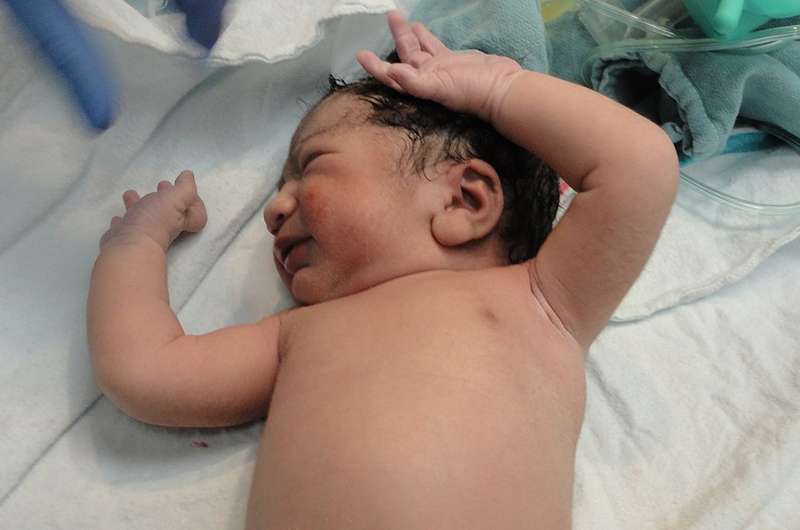Even perfectly clean hands can lead to MRSA transmission in NICU babies

Even if hospital workers practice perfect hand hygiene, MRSA can still spread among babies in the NICU, according to new research led by a Drexel University researcher.
Neal D. Goldstein, PhD, assistant research professor in the Dornsife School of Public Health, and his team of researchers decided to look at how the complex patient care environment of a neonatal intensive care unit (NICU) may lead to MRSA transmission. Focusing on hand hygiene—a top indicator of whether infections might spread in hospitals—the researchers examined transmission from baby to baby, with the hospital workers that come into contact with newborns standing as the link.
And as it turns out, even theoretically perfect compliance with hand hygiene won't completely eliminate the chance for MRSA to spread: the averaged risk reduction was 86 percent.
"The biggest implication is that hospitals should not just rely upon hand hygiene alone for protecting patients from becoming colonized and possibility infected with a difficult-to-treat organism," Goldstein said. "Rather, infection control is a multi-pronged strategy. It can incorporate early detection and measures to mitigate spread that include possible decolonization or using an antibiotic to treat a patient even before infection."
The study, which was published in Infection Control & Hospital Epidemiology, used Methicillin-resistant Staphylococcus aureus (MRSA), a difficult to treat pathogen that can be deadly for people with weak or underdeveloped immune systems, as its subject.
"We wanted to focus on an organism that is frequently encountered in hospital environments," Goldstein said. "In our vulnerable population of babies in the ICU, MRSA is of particular importance because about one third of babies that are colonized will go on to develop an invasive infection."
In his simulation study, based out of Christiana Care's NICU (in Newark, Delaware), Goldstein discovered that even if health workers had absolutely perfect hand hygiene, just under one in every 100 contacts between a baby and a hospital worker could still result in a MRSA transmission. During the average nine day stay, an infant is likely to have about 250 contacts with NICU workers that carry risk for MRSA transmission. While each contact is an opportunity for hygiene compliance, it is also potential for hygienic practices to break down.
"This sheds light on just how complex the patient care environment of a NICU is," Goldstein said. "There are so many opportunities to potentially pass an organism between healthcare workers and their patients."
Although it seemed that MRSA could not be completely wiped out through perfect hand hygiene, the study did show that the better hand hygiene was, the more it cut down on the spread of MRSA. The effect never quite leveled off, but continued to get better as hygiene levels improved.
When the team divided levels of hand hygiene into quartiles, the lowest level of cleanliness was associated with an averaged 29 percent decrease in MRSA prevalence when compared to no hand washing. And when the team looked at the two quartiles considered within the average range for hand hygiene of hospital workers, they found it correlated with a decrease in MRSA ranging between 51 and 67 percent.
However, having multiple lines of defense remains important.
"I think the reality is that infection control is not, nor can ever be, perfect," Goldstein said. "You may follow all guidelines and suggested procedures, have 100 percent adherence to these interventions, and patients can still become colonized and possibly infected."
So beyond hospitals practicing good hand hygiene and antimicrobial management, Goldstein suggests that efforts by people beyond hospital workers, including parents, visitors and the patients themselves (the non-infant patients, of course) can make a difference.
"We can follow hygiene procedures, use gowns or gloves as needed, keep a clean environment, not bring in possible fomites such as cell phones, watches, or jewelry, and be a watchdog for the hospital, requesting that healthcare workers do hand hygiene if we don't see it being done," Goldstein said. "Outside the hospital, patients and parents can be more vigilant in requesting and using antibiotics appropriately so as not to give rise to antimicrobial resistant organisms. We're all participants in infection control, not just the clinicians."
More information: Neal D. Goldstein et al, A Network Model of Hand Hygiene: How Good Is Good Enough to Stop the Spread of MRSA?, Infection Control & Hospital Epidemiology (2017). DOI: 10.1017/ice.2017.116
















